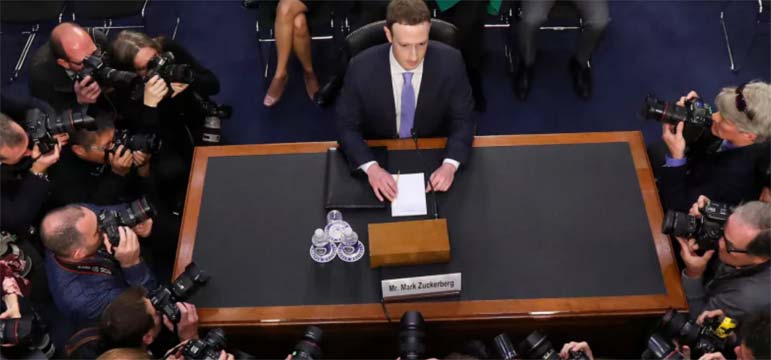
Enter the world's biggest social media company.
"We're from Facebook and we're here to help" was, essentially, the message that founder Mark Zuckerberg brought Friday to news organizations, whose business models have been trashed by the digital disruption of information and advertising while the tech platforms have reaped untold billions.
The instrument of this help, he explained to journalists and others in a mid-Manhattan auditorium, will be the Facebook News tab - anew offering on the platform that curates news and information, using both algorithms and human beings to make decisions.
And will also do something revolutionary: Pay some publishers (including The Washington Post) for their expensive-to-produce journalism.
Will it help the news industry survive and thrive?
The answer, probably, is that it will help some. And in time, it could help more.
"There is a real positive in this," said David Chavern, CEO of the News Media Alliance, which represents thousands of newspapers and other news publishers. Positive because this all-powerful tech player is "acknowledging the value of quality journalism and saying that they are willing to pay for it."
He worries, though, that the thousands of local newspapers suffering the worst - and struggling for mere survival - are being left out of the equation. Facebook's partners include a few large regional newspapers like the Los Angeles Times but leave out the vast majority.
"This won't end well," was the blunt forecast of Parker Molloy, an editor at the progressive media-watchdog group Media Matters.
Her specific concern? That Breitbart News is included in a list of trusted publishers despite being described by Steve Bannon, its former executive chairman, as "a platform for the alt-right" and often criticized as a font of disinformation.
Asked at the Friday event why Breitbart was in the mix, Zuckerberg sounded a familiar note: Facebook News "needs to have a diversity of views" and a "breadth of content."
And he noted that a news organization's being "eligible to show up" doesn't mean that its stories will be chosen.
Zuckerberg made his remarks at a "fireside chat" with the Robert Thomson, the chief executive of News Corp. The Australian media executive gave his bosses - Rupert Murdoch and his son Lachlan - a shoutout during his opening remarks at the Paley Center for Media, where waiters circulated with canapes and attendees were offered water infused with cucumber, lavender and basil.
"What took you so long?" Thomson pointedly asked Zuckerberg, about the plan to pay news organizations, including the Wall Street Journal, which is part of News Corp.
"I'll take that as a compliment," quipped the Facebook founder, who wore his trademark gray crew-neck sweater and dark jeans onstage.
It didn't really sound like a compliment, but then maybe that's a relative thing: It's been a contentious week or so for Zuckerberg, who is again under fire, including at a long congressional hearing Wednesday.
Facebook News will become available immediately to more than 200,000 people in the United States, with a broader rollout planned for early next year, The Post reported. Eventually, Zuckerberg said, he hopes it will be used by 20 to 30 million people - a modest slice of Facebook's 2 billion or so users.
As with all things Facebook does, this one ought to be viewed skeptically. The company's record on policing blatant disinformation and hate speech, particularly during the 2016 election, is beyond dismal.
It has an unfortunate tendency not to follow its own rules or standards.
In this case, one thing it has going for it is the deep involvement and journalistic credibility of a former Washington Post deputy national editor, Anne Kornblut.
For many years, Facebook - as a major worldwide disseminator of news, one that constantly makes editorial-style decisions - refused to cop to the obvious: That it is a media company, not just a platform.
With this development, that argument goes away. And because that may force a sense of responsibility about decision-making, it's a good thing.
To the extent that Facebook is putting at least some money and other resources behind high-quality journalism, that's a step forward.
But it can't leave smaller, regional publishers in the lurch while placating the major influencers in the news business.
It can't promote and partner with purveyors of disinformation in the name of ideological diversity.
And it can't just talk the game of "We're from Facebook and we're here to help." (Zuckerberg's Friday op-ed in the New York Times states as much, headlined: "Facebook can help the news business.")
Let's say, cautiously, that there's potential here.
"I've been saying for a long time that these big tech players could be an answer rather than the problem," Chavern of the News Media Alliance told me.
We'll see.
Sign up for the daily JWR update. It's free. Just click here.
(COMMENT, BELOW)
Previously:
• 08/20/19: Redemption sounds nice, but disgraced lib pundit doesn't deserve it
• 06/27/19: Dem debate felt like a nightmare version of speed dating
• 05/27/19: The outsize influence of cable news
• 03/18/19: Social-media platforms were used like lethal weapons in New Zealand --- that must change now
• 01/08/19: Campaign journalism needs an overhaul. Here's one radical idea
• 10/07/18: Nate Silver will make one firm prediction about the midterms, but most journalists won't want to hear it
• 09/07/18: A messy journalistic dilemma if New York Times reporters find out the identity of anonymous op-ed author
• 07/23/18: Mark Zuckerberg is a horror show, but there's a glimmer of truth hidden in his latest blunder
• 06/11/18: Shocked by Trump aggression against reporters and sources? The blueprint was made by Obama
• 05/14/18: Symptoms at NBC hint at a larger sickness
• 10/18/17: From the pen of an 18-year-old Harvey Weinstein: An aggressor who won't be refused
• 01/12/17: BuzzFeed crossed the line in publishing salacious 'dossier' on Trump
• 11/09/16: The media didn't want to believe Trump could win. So they looked the other way
• 11/02/16: Nate Silver blew it when he missed Trump --- now he really needs to get it right
• 10/20/16: How the Committee to Protect Journalists broke its own rule to protest Trump


 Contact The Editor
Contact The Editor
 Articles By This Author
Articles By This Author